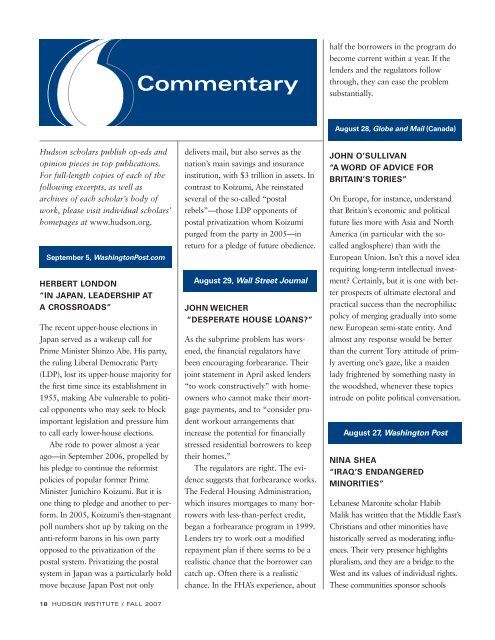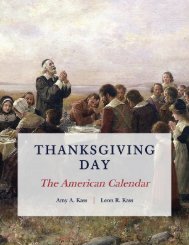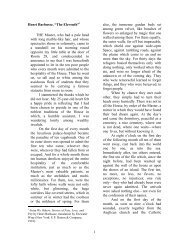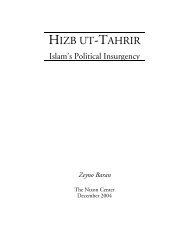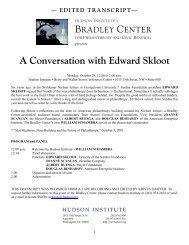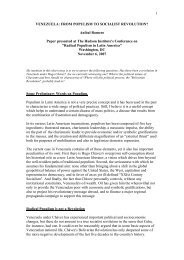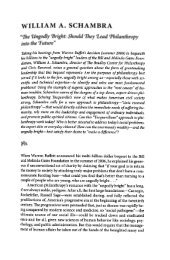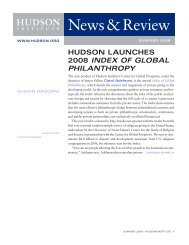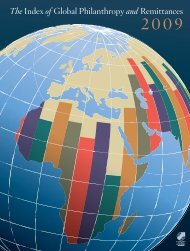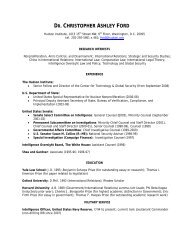You also want an ePaper? Increase the reach of your titles
YUMPU automatically turns print PDFs into web optimized ePapers that Google loves.
Commentary<br />
half the borrowers in the program do<br />
become current within a year. If the<br />
lenders and the regulators follow<br />
through, they can ease the problem<br />
substantially.<br />
August 28, Globe and Mail (Canada)<br />
<strong>Hudson</strong> scholars publish op-eds and<br />
opinion pieces in top publications.<br />
For full-length copies of each of the<br />
following excerpts, as well as<br />
archives of each scholar’s body of<br />
work, please visit individual scholars’<br />
homepages at www.hudson.org.<br />
September 5, WashingtonPost.com<br />
HERBERT LONDON<br />
“IN JAPAN, LEADERSHIP AT<br />
A CROSSROADS”<br />
The recent upper-house elections in<br />
Japan served as a wakeup call for<br />
Prime Minister Shinzo Abe. His party,<br />
the ruling Liberal Democratic Party<br />
(LDP), lost its upper-house majority for<br />
the first time since its establishment in<br />
1955, making Abe vulnerable to political<br />
opponents who may seek to block<br />
important legislation and pressure him<br />
to call early lower-house elections.<br />
Abe rode to power almost a year<br />
ago—in September 2006, propelled by<br />
his pledge to continue the reformist<br />
policies of popular former Prime<br />
Minister Junichiro Koizumi. But it is<br />
one thing to pledge and another to perform.<br />
In 2005, Koizumi’s then-stagnant<br />
poll numbers shot up by taking on the<br />
anti-reform barons in his own party<br />
opposed to the privatization of the<br />
postal system. Privatizing the postal<br />
system in Japan was a particularly bold<br />
move because Japan Post not only<br />
delivers mail, but also serves as the<br />
nation’s main savings and insurance<br />
institution, with $3 trillion in assets. In<br />
contrast to Koizumi, Abe reinstated<br />
several of the so-called “postal<br />
rebels”—those LDP opponents of<br />
postal privatization whom Koizumi<br />
purged from the party in 2005—in<br />
return for a pledge of future obedience.<br />
August 29, Wall Street Journal<br />
JOHN WEICHER<br />
“DESPERATE HOUSE LOANS?”<br />
As the subprime problem has worsened,<br />
the fi nancial regulators have<br />
been encouraging forbearance. Their<br />
joint statement in April asked lenders<br />
“to work constructively” with homeowners<br />
who cannot make their mortgage<br />
payments, and to “consider prudent<br />
workout arrangements that<br />
increase the potential for financially<br />
stressed residential borrowers to keep<br />
their homes.”<br />
The regulators are right. The evidence<br />
suggests that forbearance works.<br />
The Federal Housing Administration,<br />
which insures mortgages to many borrowers<br />
with less-than-perfect credit,<br />
began a forbearance program in 1999.<br />
Lenders try to work out a modified<br />
repayment plan if there seems to be a<br />
realistic chance that the borrower can<br />
catch up. Often there is a realistic<br />
chance. In the FHA’s experience, about<br />
JOHN O’SULLIVAN<br />
“A WORD OF ADVICE FOR<br />
BRITAIN’S TORIES”<br />
On Europe, for instance, understand<br />
that Britain’s economic and political<br />
future lies more with Asia and North<br />
America (in particular with the socalled<br />
anglosphere) than with the<br />
European Union. Isn’t this a novel idea<br />
requiring long-term intellectual investment?<br />
Certainly, but it is one with better<br />
prospects of ultimate electoral and<br />
practical success than the necrophiliac<br />
policy of merging gradually into some<br />
new European semi-state entity. And<br />
almost any response would be better<br />
than the current Tory attitude of primly<br />
averting one’s gaze, like a maiden<br />
lady frightened by something nasty in<br />
the woodshed, whenever these topics<br />
intrude on polite political conversation.<br />
August 27, Washington Post<br />
NINA SHEA<br />
“IRAQ’S ENDANGERED<br />
MINORITIES”<br />
Lebanese Maronite scholar Habib<br />
Malik has written that the Middle East’s<br />
Christians and other minorities have<br />
historically served as moderating influences.<br />
Their very presence highlights<br />
pluralism, and they are a bridge to the<br />
West and its values of individual rights.<br />
These communities sponsor schools<br />
18 HUDSON INSTITUTE / FALL 2007


